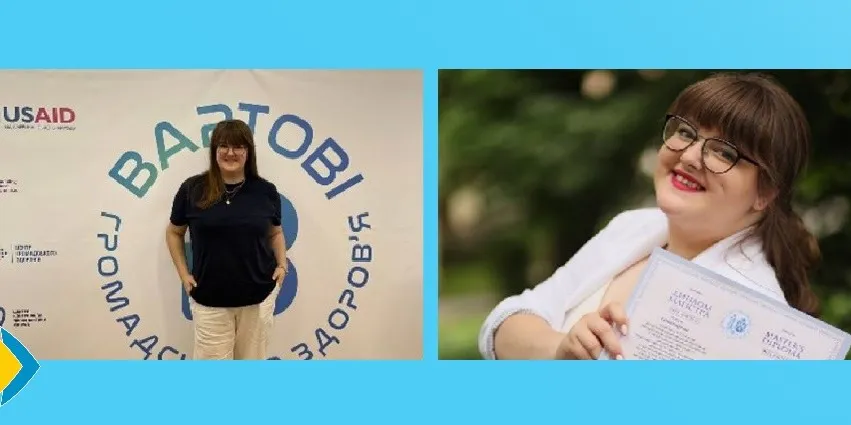
This year, Olga Gotovtseva graduated from Danylo Halytsky Lviv National Medical University with a degree in medicine. Born into a family of doctors, she has dreamed of becoming one herself since childhood. The full-scale russian invasion did not prevent her from successfully completing her studies and graduating from medical school.
"Some of our teachers did not leave the operating rooms for days, so it was difficult for them to combine medical practice with the educational process. But they tried to teach us everything they knew. It was especially worrisome when we returned from distance learning to full-time, in-person education, because you don't know when a drone or missile will arrive. During air raids, we would go down to the shelter and continue to practice there,” recalls Gotovtseva.
On the eve of her internship as an epidemiologist at the Regional Center for Disease Control and Prevention (RCDCP) for Lviv Oblast, Gotovtseva learned about the USAID-supported “Public Health Guards” campaign.
"I linked my life with epidemiology largely by accident - I originally planned to become an infectious disease specialist. A month before the start of the internship, I learned that the Lviv RCDCP, where I was supposed to work after my deployment, was going to host an open day organized by the campaign. Of course, I was interested. It was this event and further acquaintance with ‘Public Health Guards’ that turned my world upside down! I was convinced that I had chosen an interesting path and realized that modern epidemiology is an extremely promising field that is constantly evolving and is very different from what we were taught in a short course at the university. Thanks to the campaign, I learned a lot of useful information and started following the activities of professionals invited to the ‘Public Health Guards’ podcasts,” says Gotovtseva.
Today, Gotovtseva is delighted with her work as an intern. She is convinced that building an effective public health system is an important priority for Ukraine.
"People are often uninformed. They are afraid to get vaccinated or believe that tetanus is a childhood disease. Prevention is better than cure, so prevention should be our key task,” says Gotovtseva.
Amid the war that russia has unleashed, Ukraine’s public health system faces heightened pressure. Nevertheless, the Ministry of Health and the Ukrainian Public Health Center, in collaboration with donors and partners, are actively working to strengthen and advance the system and align with the best international standards for modern public health.
Implemented by the Pact-led USAID Public Health Systems Recovery and Resilience activity, the “Public Health Guards” campaign aims to attract new professionals to the sector, including students, graduates, and specialists from related medical and non-medical fields. The campaign ran from April to September 2024 with the goal of fostering a community of interested students, interns, and graduates; disseminating practical insights into the development of the public health system in Ukraine; and inspire more future professionals to join the field.
The campaign generated more than 400 unique products (e.g., YouTube videos, reels, posts) and 423 mentions in social media, reaching 1,245,647 contacts through digital channels and attracting more than 330 participants to in-person career guidance events. A key product was the development and dissemination of an online Guide to Public Health Professions. While the full impact of the campaign will only be unveiled with the internship recruitment results in 2025, preliminary data show promising trends - a 43% increase in epidemiology interns and 11% increase in laboratory diagnostics interns in 2024 compared to 2023.


